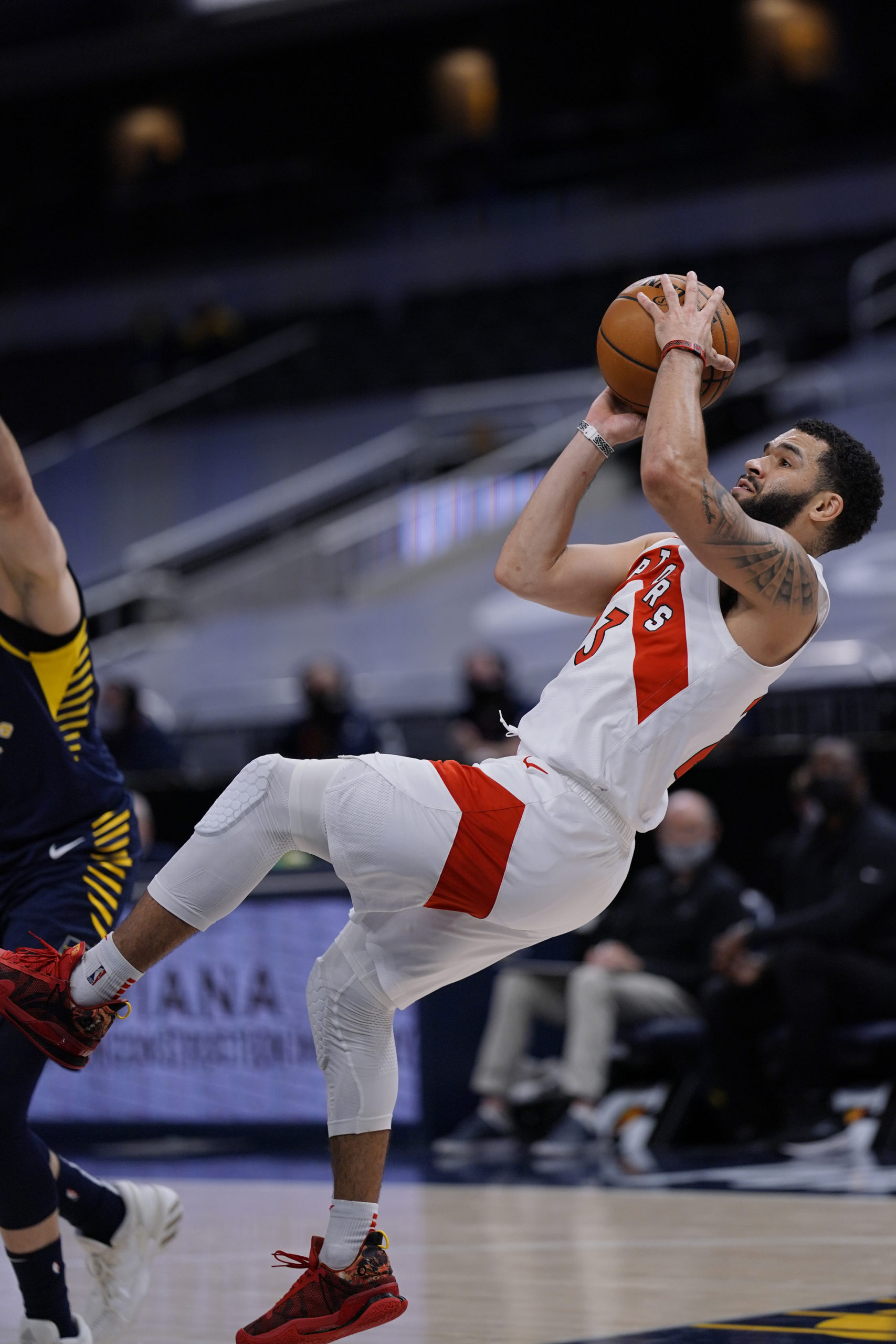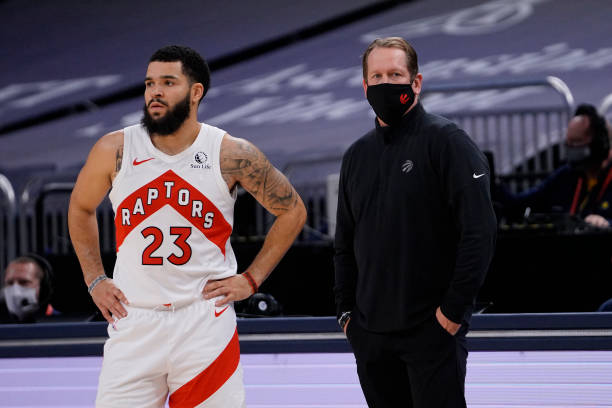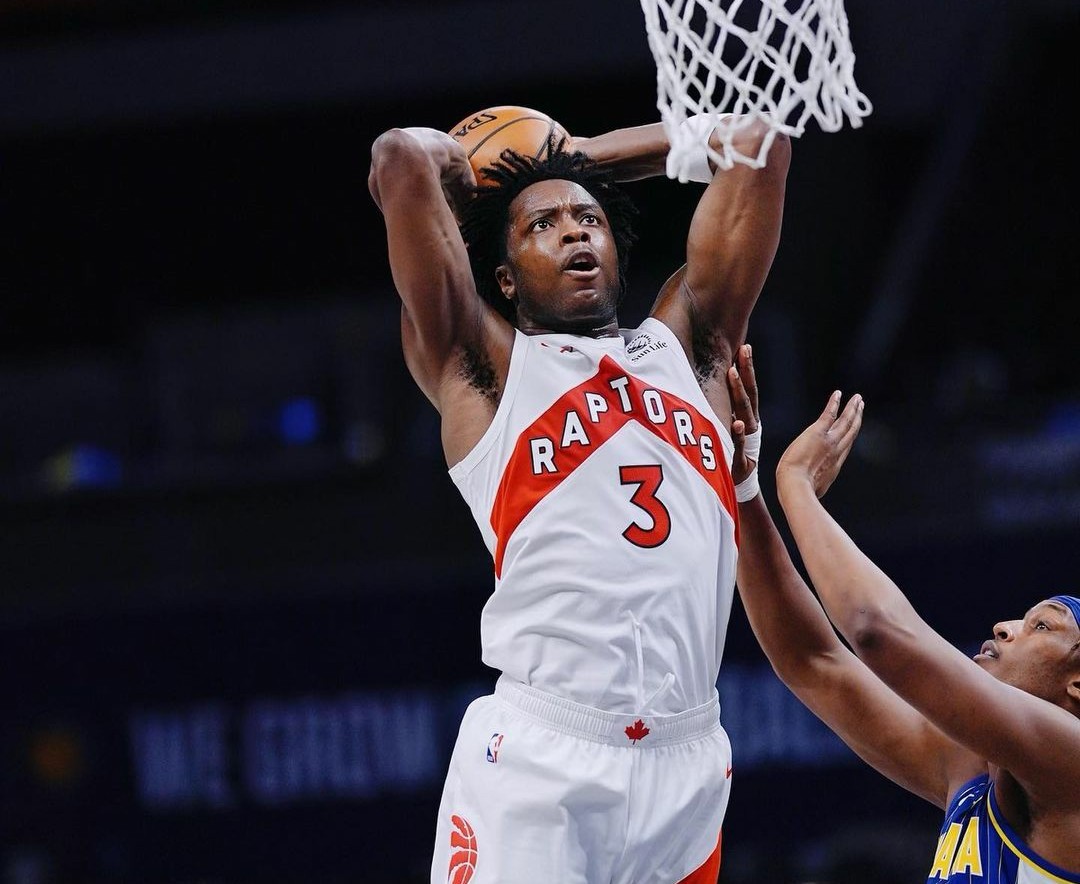1. You saw right off the bat why Nick Nurse likes playing both his 6-foot point guards together in the starting lineup, a decision that was controversial as early as one season ago. There is no substitute for basketball IQ, and both Kyle Lowry and Fred VanVleet have that in spades. On the first possession of the game, Lowry drove aggressively into the paint, picked up his dribble, saw that VanVleet had run all the way to the dunker spot to give him an option, and delivered a bounce pass to him. VanVleet pump-faked the layup and, because he was under the basket, Myles Turner expected the shot. Instead, he passed the ball out to Aron Baynes, who hit a wide-open three to give the Raptors a 3-0 lead.
— Oren Weisfeld (@OrenWeisfeld) January 26, 2021
Creating open looks from nothing in the half-court is a skill we normally equate with athleticism or step-backs or other eye-popping skills. But sometimes reading the floor really well can create those looks even if you don’t have the other skills, which is why Toronto’s dual point guard lineup is so effective: they are both extremely good at getting in the right positions to receive the ball and reading the floor to know where it should go next. The first play of the game was a perfect example.
2. The Malcolm Brogdon/Myles Turner pick-and-roll killed the Raptors in the second quarter. Baynes was unable to corral the shooter while keeping an eye on Turner, and it led to a whole bunch of Brogdon elbow jumpers.
Nick Nurse started the second half with Chris Boucher at center in a 3-2 zone, and it worked about as well as it could have. The Pacers stopped running pick-and-roll and instead had to settle for contested jumpers, and the zone kept working until the rebounding became a problem in the fourth quarter. However, give the coaching staff credit for reacting to the Pacers offence and solving it with a zone for almost the entire third quarter, in which the Pacers only scored 28 points (their lowest-scoring quarter of the game).
3. It was a weird game for Boucher, who found a way to stay on the floor not because his offense (like usual), but because of his improved defense. He is taking legitimate strides!
Boucher had one steal, two blocks, and nine rebounds to go along with great positional defense and quick rotations. He is especially effective in a zone because he is so fast, so despite not being strong enough to hang with some centers, he can be everywhere in a zone and get help from his teammates when it comes to stopping a guy like Turner in the post.
Offensively, it’s amazing how good Boucher is at corralling the passes that come his way even when they are not on target. That’s two games in a row now that Boucher has snagged a heater a couple of feet from his torso (last game from Norman Powell, this game from Terence Davis), and put it through the net. He has always been a great rim-runner partly because of his mittens, but he has taken it to another level this season, catching everything thrown within a few feet of him.
4. The Raptors only scored 17 points on the break and assisted on 24 of their 38 baskets, which is not a recipe for success. You either need to run and be able to score in transition, or you need to be able to move the ball well in the half-court and create good looks. The Raptors did neither at a high enough level, which is part of the reason they lost. In fact, it almost seemed like Indiana pulled the Raptors; trick on them, giving bad and subpar shooters open shots while making sure that good shooters like VanVleet and Anunoby only had contested looks.
5. Speaking of running in transition, Kyle Lowry’s presence actually seemed to deter that aspect of the Raptors’ game. I’m not sure if it was fatigue or intentional, but when Lowry was in the game, he largely walked the ball up the floor and allowed the defense to set before running anything. We are not used to seeing that from Kyle, who in years past has been known to run on makes and misses and usually create really efficient offense from that.
To be fair to him, the Raptors are coming off a shortened offseason and Lowry is 34-years-old. But it’s just something I noticed.
On the other hand, VanVleet — who had a great game to be sure — is almost too aggressive in transition. He did choose opportune moments to run — when the Raptors had more guys coming up the floor than the Pacers had back on defense — but too often in this one he tried to put up a contested layup instead of looking for his teammates, who were often open spotted up around the three-point line.
6. It’s fun as it is to complain about the refereeing on Twitter (is it even fun? I’m not sure. It does help unite us against them, though), the Raptors have been getting into foul trouble all season, especially when they play small. They sent the Pacers to the line a season-high 45 times tonight.
That is a problem because the identity of this team is that they like to play small and therefore aggressively, forcing a lot of turnovers and team-rebounding to make it work. The Raptors need to be much more disciplined if they want to play that way: they need to stop digging and grabbing arms, they need to get into the right positions to rebound, and they need to foul if they are going to foul, rather then sending guys to the line for the and-one.
Interestingly, the Raptors rarely get called for blocks. Because they play small, most of the guys are good at staying in front of their matchup. The problem comes when they help, as they often rotate a step too slowly and are forced to overcompensate by fouling on the shot.
7. Terence Davis is still getting rotation minutes ahead of guys like Malachi Flynn, Matt Thomas, and Paul Watson. The frontcourt seems to have sorted itself out, but the backcourt has not.
Davis is very prone to mistakes on both sides of the floor, often caught ball-watching on defence and giving the ball away on offense. He makes up for some of those points by being a good three-point shooter, and his size theoretically makes him a better backcourt partner with one of the small guards, but he has been an overall negative all season and, with the wealth of guards on the roster, it would be nice to see someone else get some run.
8. Jack Armstrong is a national treasure. This season has been weird in that they are no longer rotating between Sportsnet and TSN, and Sportsnet has actually gotten more games so far, which is why Raptors’ fans have been missing Jack so much.
Ball getting heavy in your hands is such a great way to describe overthinking a wide open shot. Jack the king
— Vivek Jacob (@vivekmjacob) January 26, 2021
Jack has such a unique ability to bring a certain lightness to the broadcast with his positive demeanour and jokes (on why the refs missed a call early: “it’s Monday”), while still being serious in crucial moments and bringing insight throughout the broadcast. He was calling out Jeremy Lamb getting hot before he even really got hot, explained that Toronto’s zone was working, praised T.J. McConnell for his aggressiveness and playmaking (he was really impressive in both games), and explained how important Turner was for the Pacers at the end of the game.
We miss you, Jack. Say young forever.



